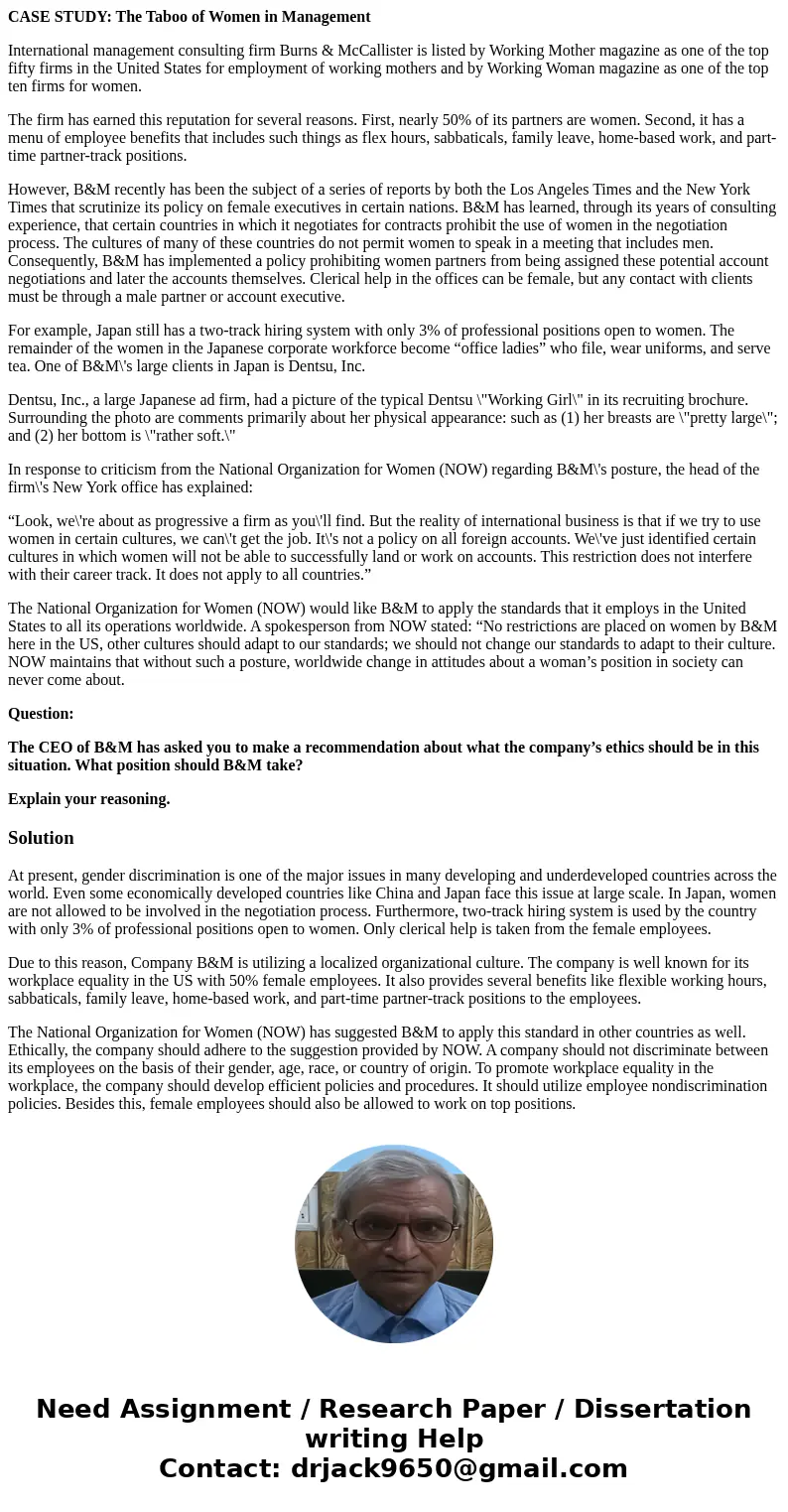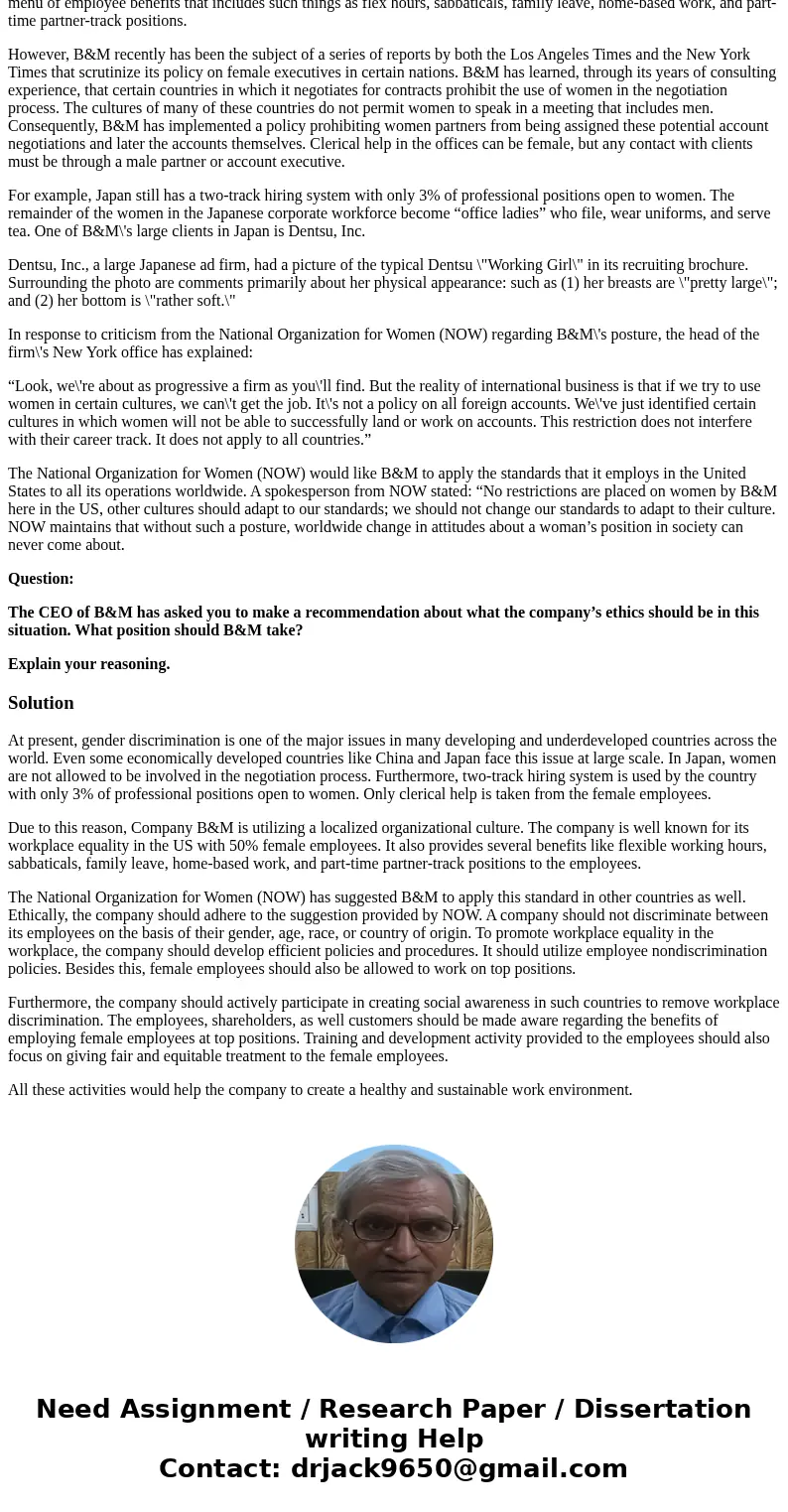CASE STUDY The Taboo of Women in Management International ma
CASE STUDY: The Taboo of Women in Management
International management consulting firm Burns & McCallister is listed by Working Mother magazine as one of the top fifty firms in the United States for employment of working mothers and by Working Woman magazine as one of the top ten firms for women.
The firm has earned this reputation for several reasons. First, nearly 50% of its partners are women. Second, it has a menu of employee benefits that includes such things as flex hours, sabbaticals, family leave, home-based work, and part-time partner-track positions.
However, B&M recently has been the subject of a series of reports by both the Los Angeles Times and the New York Times that scrutinize its policy on female executives in certain nations. B&M has learned, through its years of consulting experience, that certain countries in which it negotiates for contracts prohibit the use of women in the negotiation process. The cultures of many of these countries do not permit women to speak in a meeting that includes men. Consequently, B&M has implemented a policy prohibiting women partners from being assigned these potential account negotiations and later the accounts themselves. Clerical help in the offices can be female, but any contact with clients must be through a male partner or account executive.
For example, Japan still has a two-track hiring system with only 3% of professional positions open to women. The remainder of the women in the Japanese corporate workforce become “office ladies” who file, wear uniforms, and serve tea. One of B&M\'s large clients in Japan is Dentsu, Inc.
Dentsu, Inc., a large Japanese ad firm, had a picture of the typical Dentsu \"Working Girl\" in its recruiting brochure. Surrounding the photo are comments primarily about her physical appearance: such as (1) her breasts are \"pretty large\"; and (2) her bottom is \"rather soft.\"
In response to criticism from the National Organization for Women (NOW) regarding B&M\'s posture, the head of the firm\'s New York office has explained:
“Look, we\'re about as progressive a firm as you\'ll find. But the reality of international business is that if we try to use women in certain cultures, we can\'t get the job. It\'s not a policy on all foreign accounts. We\'ve just identified certain cultures in which women will not be able to successfully land or work on accounts. This restriction does not interfere with their career track. It does not apply to all countries.”
The National Organization for Women (NOW) would like B&M to apply the standards that it employs in the United States to all its operations worldwide. A spokesperson from NOW stated: “No restrictions are placed on women by B&M here in the US, other cultures should adapt to our standards; we should not change our standards to adapt to their culture. NOW maintains that without such a posture, worldwide change in attitudes about a woman’s position in society can never come about.
Question:
The CEO of B&M has asked you to make a recommendation about what the company’s ethics should be in this situation. What position should B&M take?
Explain your reasoning.
Solution
At present, gender discrimination is one of the major issues in many developing and underdeveloped countries across the world. Even some economically developed countries like China and Japan face this issue at large scale. In Japan, women are not allowed to be involved in the negotiation process. Furthermore, two-track hiring system is used by the country with only 3% of professional positions open to women. Only clerical help is taken from the female employees.
Due to this reason, Company B&M is utilizing a localized organizational culture. The company is well known for its workplace equality in the US with 50% female employees. It also provides several benefits like flexible working hours, sabbaticals, family leave, home-based work, and part-time partner-track positions to the employees.
The National Organization for Women (NOW) has suggested B&M to apply this standard in other countries as well. Ethically, the company should adhere to the suggestion provided by NOW. A company should not discriminate between its employees on the basis of their gender, age, race, or country of origin. To promote workplace equality in the workplace, the company should develop efficient policies and procedures. It should utilize employee nondiscrimination policies. Besides this, female employees should also be allowed to work on top positions.
Furthermore, the company should actively participate in creating social awareness in such countries to remove workplace discrimination. The employees, shareholders, as well customers should be made aware regarding the benefits of employing female employees at top positions. Training and development activity provided to the employees should also focus on giving fair and equitable treatment to the female employees.
All these activities would help the company to create a healthy and sustainable work environment.


 Homework Sourse
Homework Sourse